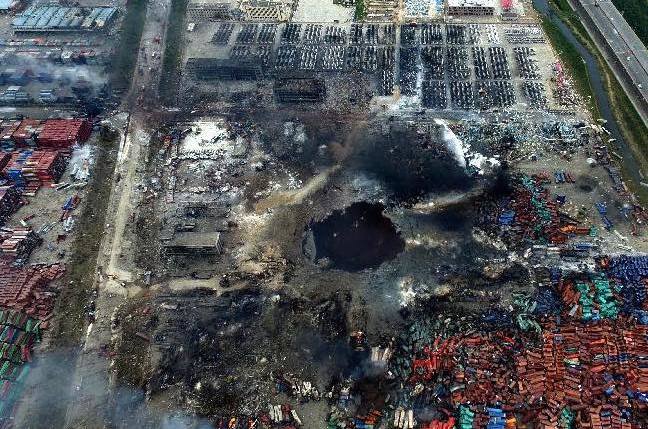The multiple explosions that rocked the Chinese port city of Tianjin on Wednesday August 12 is a stark reminder of the dangers lurking around the corner in Apapa as a result of the large concentration of fuel depots and tank farms which harbour large quantities of highly inflammable liquids.
Safety experts have severally warned on the need to relocate the tank farms further away from Apapa, which serves largely as a port community and a residential area.
The Tianjin explosions, which led to the death of more than 130 people including 12 firefighters, have been blamed on China’s questionable industrial safety records. Experts said the hazardous chemicals warehouse where it took place should not have been built so near a residential area.
While official figures estimated the size of the blast to be the equivalent of around 21 tonnes of TNT, one British safety expert said he believed it could be anything up to 100 tonnes – the rough equivalent of 200 large car bombs.
Dr. Tony Cox, a fellow of the Institution of Mechanical Engineers and an accident investigation expert, also queried why a facility holding such large quantities of volatile chemicals had not been housed in a more isolated area.
“The big issue here is the proximity between the facility and its neighbours,” he told The Telegraph. “Not only do you have flats with their windows being broken at least a kilometre away – which shouldn’t be happening – you also have neighbouring facilities with their own workforces who could be at risk.
“It also appears to have been a huge blast, which suggests that whatever hazardous goods were inside were kept in very large quantities together rather than separated into smaller individual lots.”
The explosion also disrupted activities at the world’s fourth largest port by throughput tonnage and the ninth in container throughput.
Dr. Cox could as well have been speaking about Apapa.
Apapa, which is primarily a port community, is home to over 260,000 people. It also plays host to the nation’s top two seaports – the Lagos Port Complex and the Tin Can Island Port Complex. In addition to these, there are about 68 tank farms in the area. These tank farms were a strange phenomenon until about 15 years ago when they Nigeria began massive importation of refined petroleum products as a result of the breakdown of the nation’s refineries. The decimation of the country’s refining capabilities was seen as a deliberate ploy to create room for unbridled importation of much needed fuel at subsidized rates. Government in turn pays huge amounts as ‘subsidy’ to dubious importers made up mostly of very powerful Nigerians and influential politicians. The sleaze and corruption which bedeviled the subsidy regime further compounded the woes of the refineries and led to the establishment of a plethora of tank farms, with little or no regards to safety, in and around the ports in Apapa. The siting of the tank farms in Apapa was done predominantly to take advantage of proximity to the ports to discharge vessels bringing in the products, thereby saving the operators huge transportation costs. The worrisome aspect of this arrangement however borders on safety concerns as it is believed that most of the depots have failed to adequately comply with safety measures. There is no gainsaying that fuel depots must operate under very stringent safety conditions because they store and sell a highly flammable liquid.
Petrol, which is mostly stored in these tank farms, gives off highly flammable vapour even at very low temperatures. Because of the flammability of petrol vapours, these tank farms carry a risk of fire or explosion not common to other types of operation. Ignition of petrol vapours can happen if vapour comes into contact with a heat source capable of igniting it. An ignition spark might come from an electrical switch, a cigarette or a static electrical discharge. Petrol vapour is heavier than air and tends to sink to the lowest possible level of its surroundings and may gather in tanks, cavities, drains, pits or other low points and will travel across the ground due to gravity (down-hill) or may be carried in the direction of the wind.
It has therefore become imperative for government, through the Department of Petroleum Resources (DPR) and the Nigerian Ports Authority (NPA), to immediately commission a safety audit on the tank farms and ensure that they strictly adhere to approved and internationally acceptable safety procedures. There should also be a phased relocation of the tank farms to remote locations, away from the port and residential areas. A stitch in time, the saying goes, saves nine.
Copyright Ships & Ports Ltd. Permission to use quotations from this article is granted subject to appropriate credit given to www.shipsandports.com.ng as the source.
